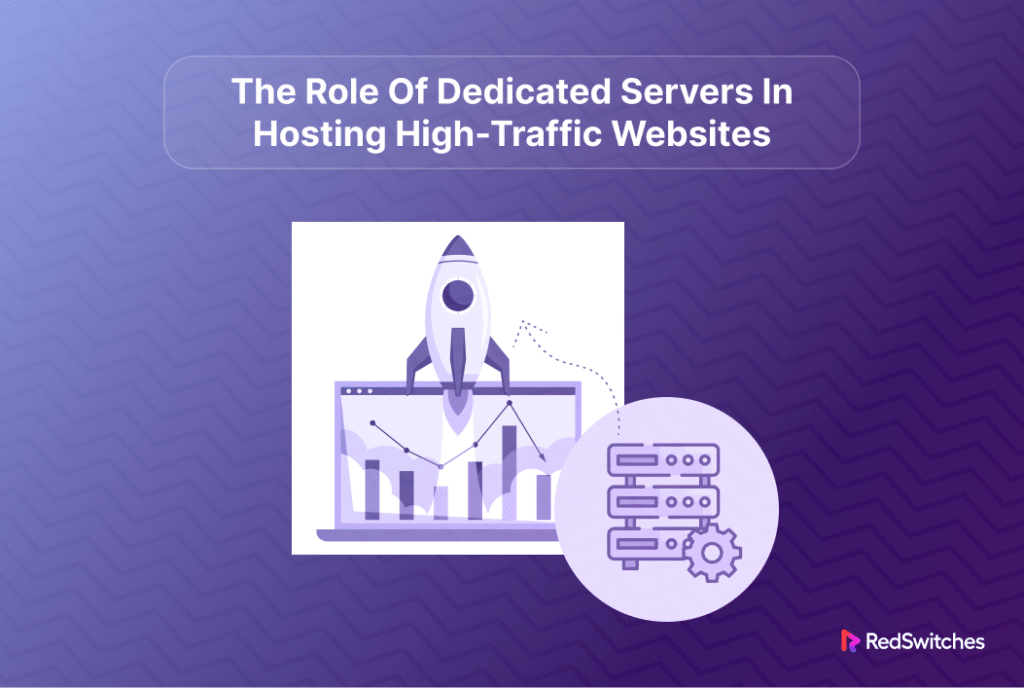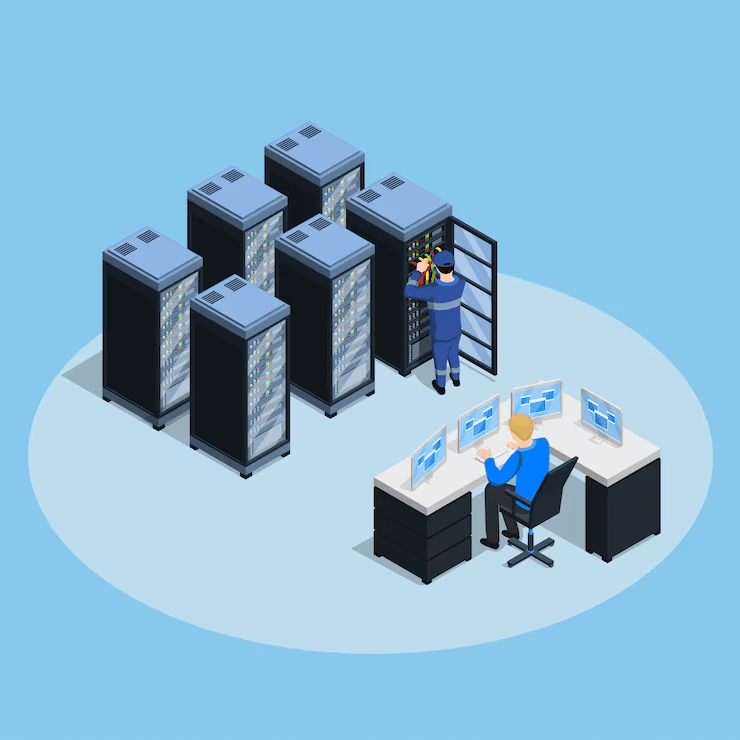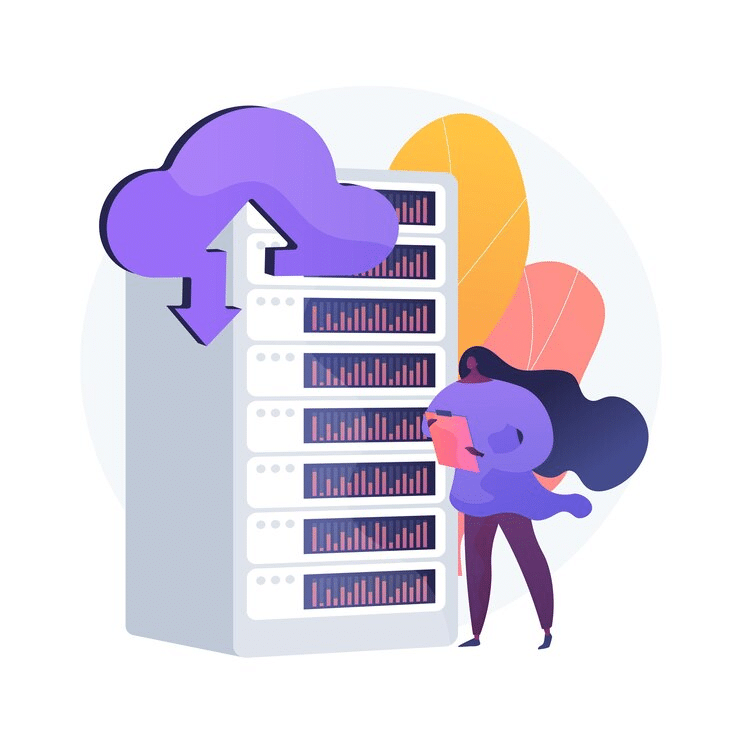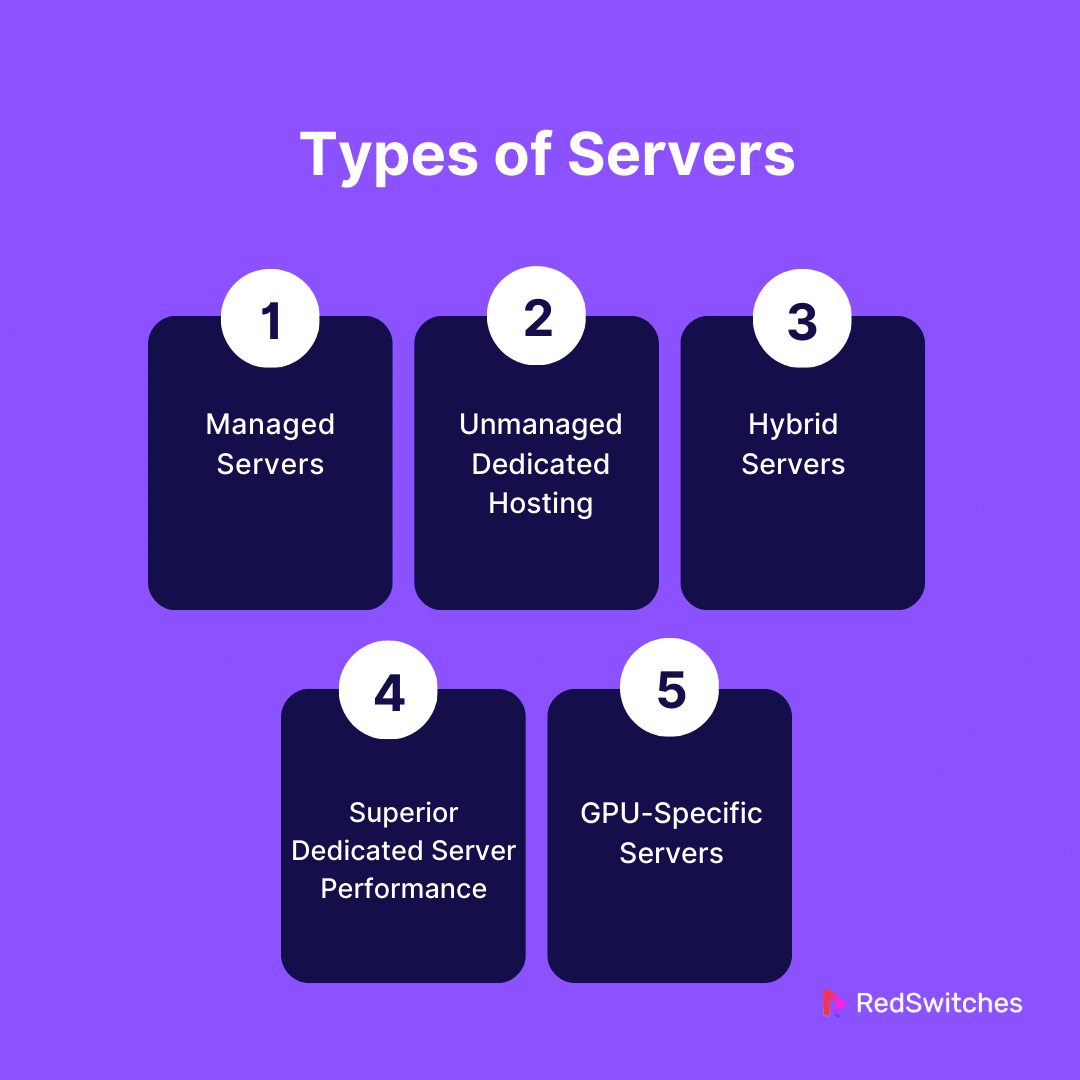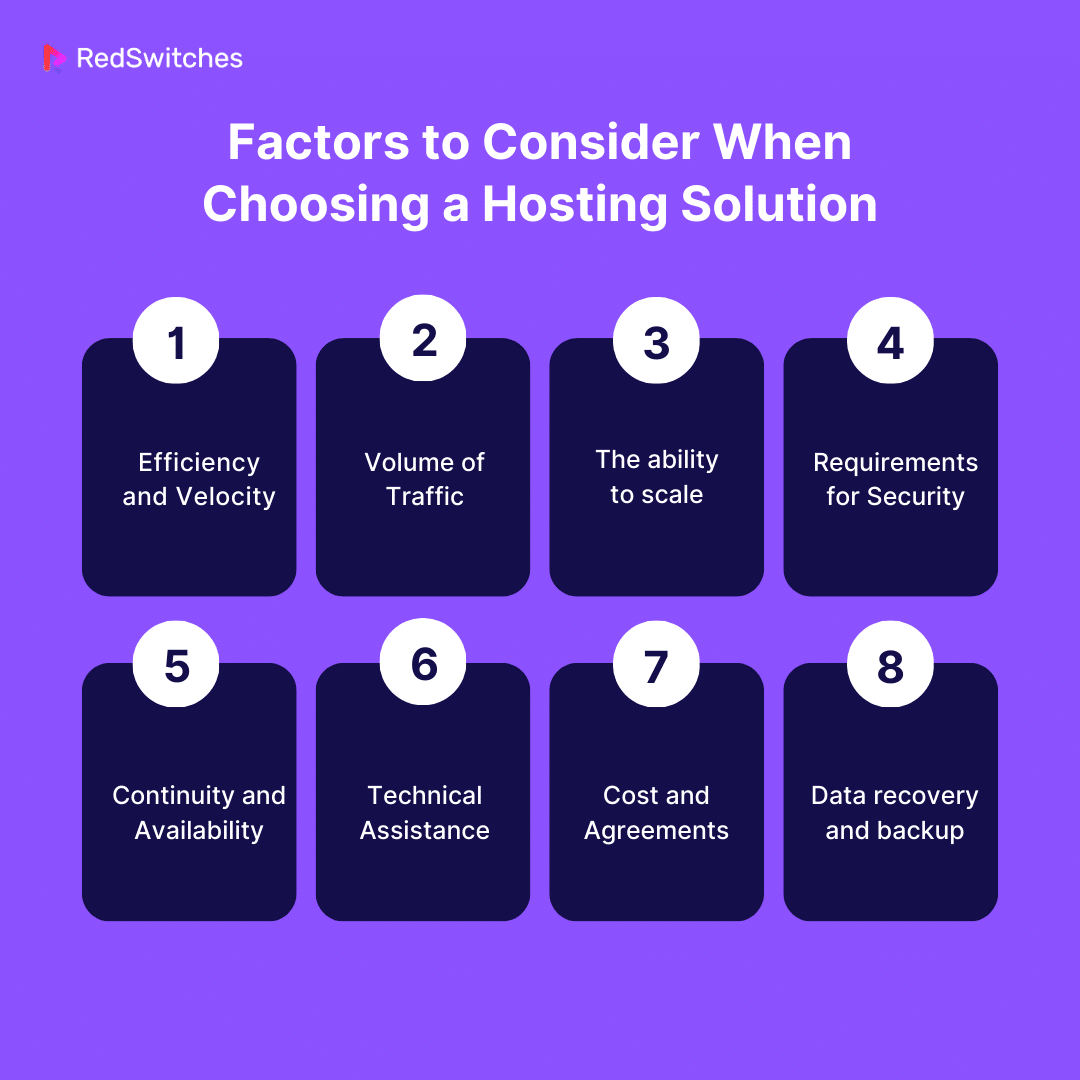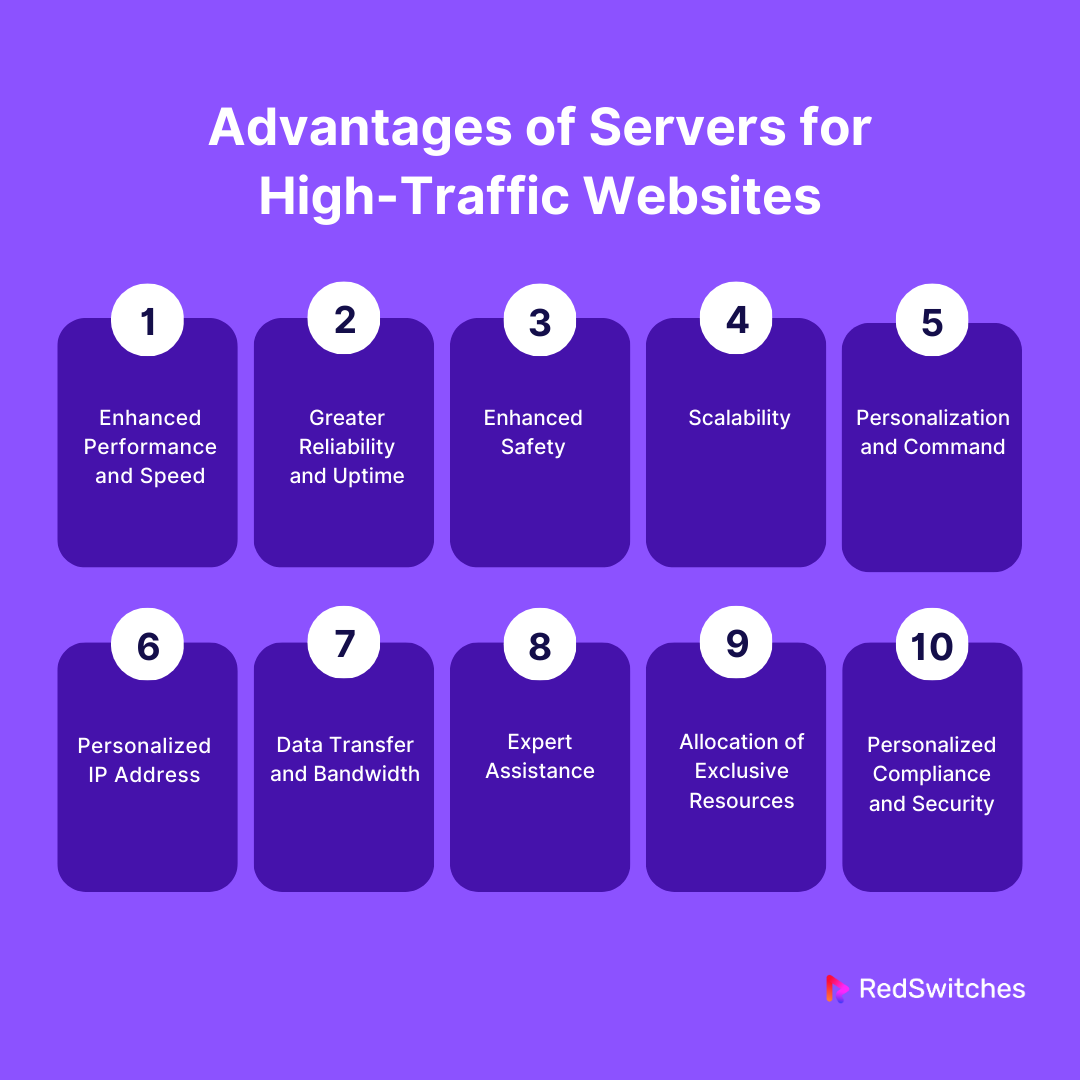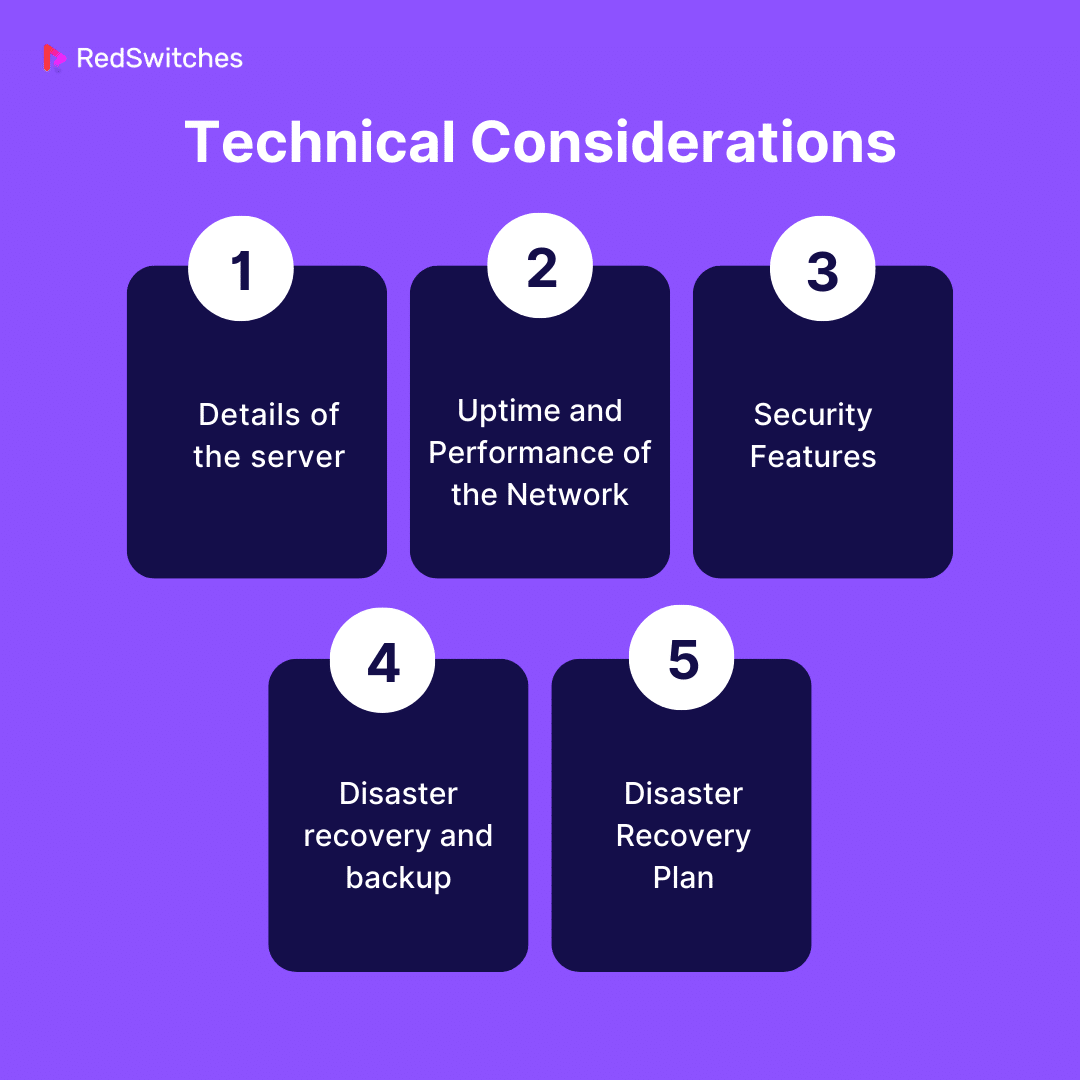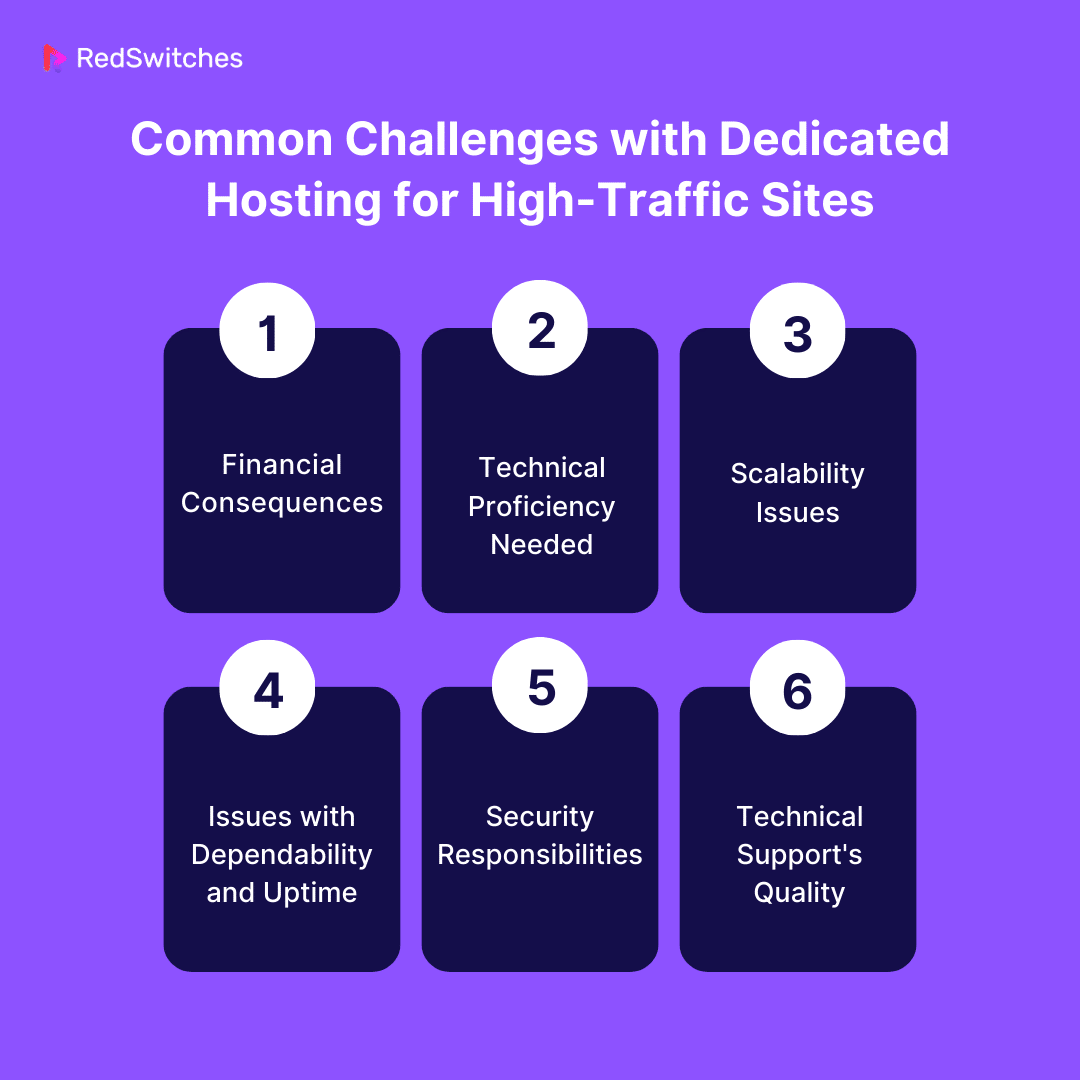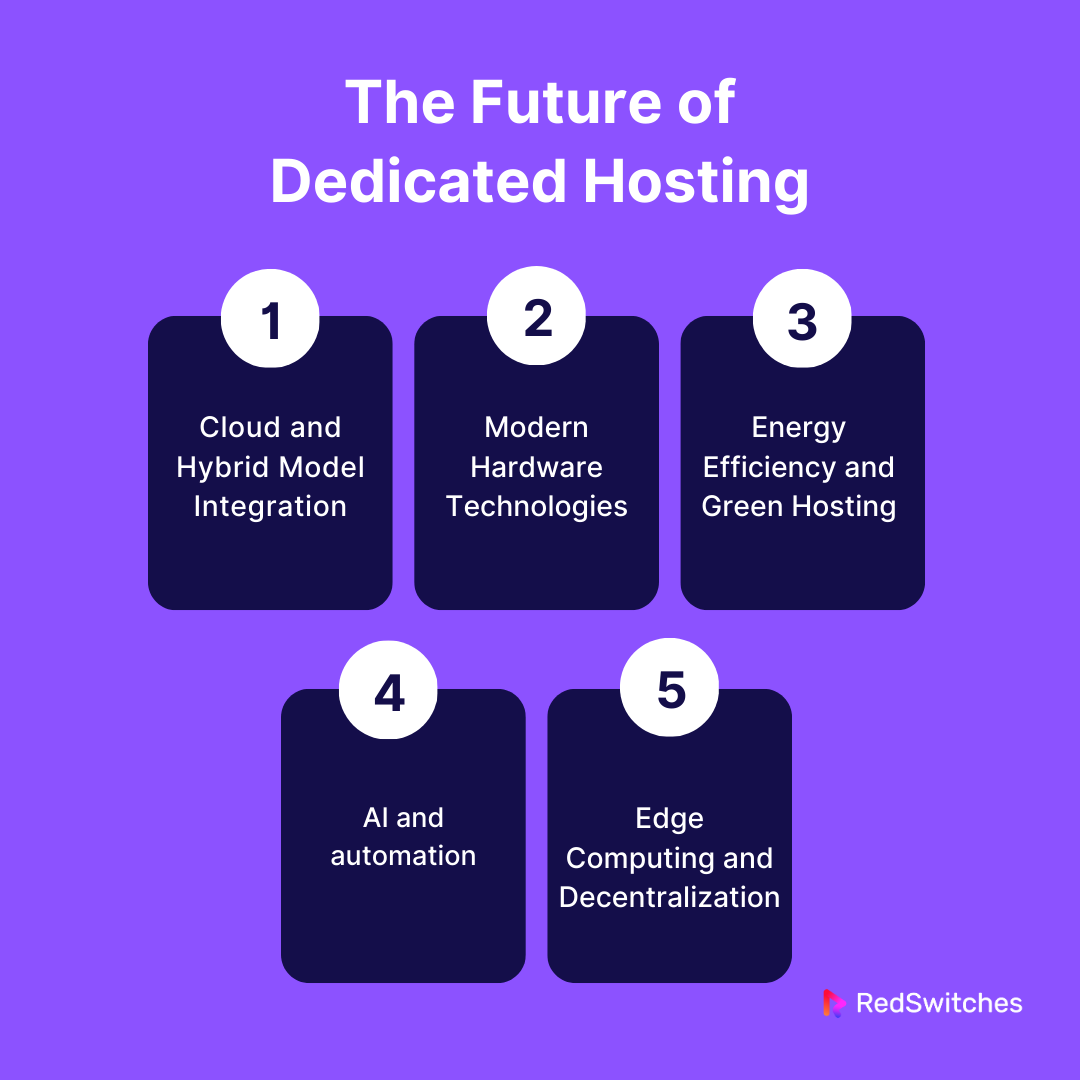Key Takeaways
- Dedicated servers offer exclusive use of resources, ensuring high performance and security.
- Types include managed and unmanaged, each suiting different levels of technical expertise.
- Important factors in choice include performance needs, security, scalability, support, and budget.
- They provide significant advantages for high-traffic sites, including reliability, customization, and control.
- Technical setup and ongoing management can be complex and costly.
- The future of dedicated hosting looks promising, with technological advancements enhancing efficiency and scalability.
- A thorough cost-benefit analysis is essential to determine the viability of high-traffic websites, balancing improved performance and security against higher costs.
The functionality and dependability of a website is critical in today’s digital environment, particularly for sites with heavy traffic. Server hosting promises to satisfy these needs by providing unmatched resources and control. This all-inclusive tutorial aims to simplify dedicated server hosting and showcase it as the ideal choice for websites with significant traffic.
This blog aims to guide you through the confusing world of hosting choices. It covers everything from the basics of servers to picking the best service. We will show you how to use server hosting to achieve the best website performance and security, regardless of your computer experience.
Table of Contents
- Key Takeaways
- What Are Dedicated Servers?
- How do Servers Work?
- Types of Servers
- Factors to Consider When Choosing a Hosting Solution
- Advantages of Servers for High-Traffic Websites
- Technical Considerations When Choosing a Server
- Common Challenges with Dedicated Hosting for High-Traffic Sites
- The Future of Dedicated Hosting
- Conclusion
- FAQs
What Are Dedicated Servers?
Credits: Freepik
Dedicated hosted servers provide the best hosting. They give a stable base for websites, apps, and services. These need the highest control, security, and speed. One client uses a server instead of shared hosting or VPS (virtual private server). VPS divides resources among many users.
Because of this exclusivity, the client can access the server’s memory, processing power, and storage. This lets their website or application run as efficiently as possible. It won’t be hampered by the needs of other users sharing the same space.
A server’s architecture is made to meet the demanding requirements of websites with a lot of traffic. The servers include strong processors, large RAM capacities, and many storage options. The storage comes in HDD (Hard Disc Drive) and SSD (Solid State Drive) formats. SSDs are preferred because they have faster data access. This speed can greatly improve apps and websites. This is especially true for those who need to process data in real time and load quickly.
Servers improve the SEO of websites. They also lower the risk of IP blacklisting. This can happen with shared hosting. This is vital for companies that rely heavily on email marketing. They want to ensure their messages reach their audience without being flagged as spam.
How do Servers Work?
Credits: Freepik
Let’s understand the working procedure of what is a dedicated server.
Configuration and Setup
Hardware Selection: Choosing the right hardware to meet the client’s needs is the first step in the process. This includes picking the right RAM size, storage type (HDD or SSD), CPU type and speed, and network settings. The hardware choice directly affects the server’s reliability, capacity, and performance, making it essential.
Software Installation: After installing the hardware, software programs and the operating system (OS) are installed. Customers can select from various operating systems, including Windows Server and Linux versions (such as Ubuntu and CentOS), based on which ones work best with the programs they want to use.
Configuration and Customisation: Following the OS installation, the server is set up under the customer’s particular needs. Installing application-specific software and configuring network setups and security protocols (firewalls, encryption) are included. Clients can change the server’s configuration because they have administrative or root access.
Operation
Resource Allocation: The client’s website or application receives all of the resources from the dedicated server. As a result, the client alone utilizes the CPU, memory, storage, and bandwidth, guaranteeing excellent speed and stability—particularly crucial in situations with heavy traffic.
Traffic Handling: When handling large amounts of traffic, dedicated servers excel. The server’s resources are optimized to maintain the responsiveness and availability of the website or application, even during periods of high traffic.
Security and Compliance: Clients can put in place tailored security measures to safeguard their data and adhere to legal requirements with a dedicated server. This offers higher protection than shared environments and includes data encryption, security fixes, and complex firewall setups.
Supervisory
Monitoring and Upkeep: To guarantee peak performance, dedicated servers need constant monitoring and upkeep. This includes hardware inspections, performance monitoring, and routine OS and application updates. Customers might choose managed hosting, where the hosting company handles these responsibilities.
Service and Troubleshooting: Reputable hosting companies give dedicated hosting customers round-the-clock service. This assistance ensures issues are quickly resolved by covering software upgrades, hardware concerns, and troubleshooting.
Scalability: Dedicated servers can be upgraded to meet expanding needs despite their fixed resources. This could entail increasing the RAM, increasing the amount of storage, or upgrading the CPU. Additionally, some clients can expand by enhancing their infrastructure with extra dedicated servers.
Types of Servers
Let’s understand the types of Servers.
Managed Servers
These servers are for users who need strength and exclusivity. But, they lack the time or know-how to handle server operations. For them, managed servers are perfect. The hosting provider handles all technical matters. This includes configuration, software installs, security updates, routine maintenance, and tech support. With this kind, customers may concentrate on their main company operations while taking advantage of dedicated server’s strong performance and security.
Also Read Essential Tips for Maximum Security of Cloud Data with VPS and Dedicated Server Security how to keep server safe
Unmanaged Dedicated Hosting
Usually, clients have the tech skills to run servers on their own. They choose unmanaged dedicated servers. In this case, the hosting company’s only responsibilities are maintaining the server’s physical infrastructure and guaranteeing internet access. The client is responsible for all other tasks, including OS installation, updating, security patching, and server maintenance. Although it needs more technical know-how, this type gives more control and customization.
Hybrid Servers
Hybrid dedicated servers combine the best parts of cloud and dedicated hosting. They provide the scalability and flexibility of the cloud. But they have the physical resources of a dedicated server. Businesses that must swiftly scale their resources or deal with varying traffic patterns may find this type useful.
Superior Dedicated Server Performance
These servers are for applications and websites with heavy traffic. They are also for jobs needing much processing power, like data analysis and complex database maintenance. With top-tier processors, fast SSD storage, and large RAM capacity, these servers can handle demanding workloads and guarantee quick processing times. They are appropriate for companies that need to operate with great dependability and performance.
GPU-Specific Servers
In addition to the regular CPU, GPU dedicated servers have powerful Graphics Processing Units (GPUs). These servers are best for jobs like scientific simulations, AI, and machine learning projects. They are also good for video rendering. These jobs need lots of graphics power or parallel computing. Applications like games can use GPU acceleration. They will see a big speedup on GPU servers.
Also Read: Dedicated Servers for Gaming: Transforming the Multiplayer Experience
Factors to Consider When Choosing a Hosting Solution
Let’s discuss the Factors to consider when choosing a Hosting Solution.
Efficiency and Velocity
Your hosting choice strongly impacts your website’s responsiveness and loading speed. Because dedicated resources are available, cloud hosting and servers typically perform better than shared hosting. The CPU, RAM, and disc type (SSD vs. HDD) of the server should be considered since these can affect how quickly and effectively your website loads.
Volume of Traffic
Be prepared for the volume of visitors your website will get. Websites with modest to moderate traffic might get by with shared hosting. However, high-traffic websites require scalable cloud solutions or the reliable infrastructure of servers to handle unexpected spikes in traffic without downtime or performance difficulties.
The Ability to Scale
Consider what you will need in the future. Choose a hosting plan that can expand with your company if you anticipate that your website will get larger. In this sense, cloud hosting is especially adaptable since it lets you dynamically modify resources in response to variations in traffic. Modifying servers is possible, although such modifications usually involve additional preparation and potential downtime.
Requirements for Security
Security is crucial, particularly for websites that deal with important information. Examine the hosting company’s security features, such as firewalls, SSL certificates, DDoS defense, and frequent backups. Dedicated and managed hosting packages have more powerful security and customization choices. They meet specific security needs.
Continuity and Availability
Thanks to your selected hosting option, users should always be able to access your website. Seek hosting companies that offer high uptime guarantees (99.9% and higher). Servers are more dependable than shared hosting because users do not share resources.
Technical Assistance
Trustworthy, round-the-clock technical support is imperative. This is especially true if you lack technical expertise. Ensure the hosting company provides thorough support via various channels (e.g., phone, chat, email) to assist with any issues.
Cost and Agreements
Consider the hosting service’s price. This includes setup costs, monthly or yearly fees, and extra fees for going over storage or bandwidth limits. Think over the terms and duration of the contract, and search for flexibility in case your hosting requirements alter. Remember that the cheapest choice isn’t necessarily the best for hosting. Performance, reliability, and support are important. They often come at a charge.
Data recovery and backup
You must keep consistent backups. You also need effective data recovery procedures. They are crucial for protecting your data from corruption or loss. Look at the hosting provider’s backup policy. Note its frequency, location, and ease of data recovery.
Advantages of Servers for High-Traffic Websites
This section will discuss the benefits of Servers for High Traffic Websites.
Enhanced Performance and Speed
Dedicated hosted servers provide all their resources exclusively to one website or application, eliminating the “noisy neighbor” effect often seen in shared hosting environments. This exclusivity ensures your site can access the full bandwidth, CPU, and RAM available, significantly improving loading times and overall performance. This means handling multiple simultaneous requests efficiently for high-traffic websites, leading to a smoother user experience and potentially higher search engine rankings.
Greater Reliability and Uptime
With a server, the downtime risks are minimized as you’re not sharing resources with other websites that could consume more than their fair share, leading to server overloads. Hosting providers often offer uptime guarantees and robust support for dedicated hosting, ensuring issues are quickly resolved. This reliability is crucial for maintaining high-traffic websites’ credibility and user trust.
Enhanced Safety
Custom security measures can be implemented on servers to meet your website’s unique requirements. Firewalls, security procedures, and encryption designed to protect sensitive data are a few examples. There is a considerably lower chance of cross-site contamination or attacks because you are not sharing the server with any other entity. This increased security is essential for websites that manage personal or financial data.
Scalability
Dedicated server provide high scalability within their set resource constraints. Select a server configuration based on your present requirements, and if your website expands, you can improve RAM, CPU, or storage. High-traffic websites can continue to offer a flawless user experience even as the number of visitors rises because of this scalability.
Personalization and Command
The ability to modify the server environment to your precise specifications is made possible by having root access to the server. This includes the capacity to set up and install any operating systems, software, and apps required to maximize the operation and performance of your website. This degree of customization is very useful for websites that run custom programs or need certain setups.
Personalized IP Address
Because shared hosting allows other people’s behaviors to impact your site’s reputation, servers come with dedicated IP addresses. This is particularly crucial for search engine optimization and websites that need SSL certificates to conduct safe online transactions.
Data Transfer and Bandwidth
Websites with a lot of traffic use a lot of data and bandwidth. Generous or even unlimited bandwidth allocations are a standard feature of servers, guaranteeing that traffic surges won’t result in extra fees or performance throttling. This capacity is essential to preserving operational stability during high traffic.
Expert Assistance
Higher levels of assistance from the hosting company are frequently included with dedicated hosting services. This includes accessing a group of professionals who can help with server administration, technical problems, and optimization techniques. This help can be extremely beneficial for businesses that mostly depend on their web presence.
Also Read 25 WordPress Speed Optimization Hacks
Allocation of Exclusive Resources
The unique resource allotment is one of the main benefits of having servers for websites with a lot of traffic. A server guarantees that all of its processing power and resources are exclusively devoted to one website, unlike shared hosting, which distributes resources among several websites. This implies that the website does not need to share or compete with other users for the server’s CPU, RAM, or storage capacity. Instead, it can make full use of these resources.
Personalized Compliance and Security
Servers allow you to install security and compliance solutions tailored to your website’s requirements. This is especially helpful for websites operating in finance, healthcare, or e-commerce sectors, subject to strict regulations.
Technical Considerations When Choosing a Server
Choosing server hosting involves many technical factors. This is especially true for websites with heavy traffic. They are key to ensuring the best speed, security, and scalability. Here is a thorough rundown of the important technical factors to think about:
Details of the server
CPU/Processor: The CPU on the server ought to be fast enough and have enough cores to manage the traffic to your website. Processing multiple threads using a multi-core CPU at once could benefit high-traffic sites.
RAM: Sufficient RAM is essential for swift data processing and managing multiple user requests simultaneously. Your website’s intricacy and traffic volume determine how much RAM is required.
Storage: For faster data access speeds, Solid State Drives, or SSDs, are advised over Hard Disc Drives, or HDDs. Consider how much storage space your website’s database and content will require. Plan for future expansion as well to prevent needless upgrades or migrations.
Bandwidth: Verify that the server has the bandwidth to manage the data transfer requirements of your website, taking into account both the volume of traffic now and any future growth.
Uptime and Performance of the Network
Uptime assurance: To ensure that consumers can access your website at all times, pick a hosting company with a high uptime guarantee (99.9% or greater).
Data Centre Location: The latency and speed of your website may be impacted by the data center’s actual location. To reduce data transfer delays, your server should ideally be close to your intended audience.
Verify whether the hosting company has failover and redundancy methods in place for crucial systems (such as the network, cooling system, and electricity) to minimize downtime during a hardware breakdown.
Security Features
Firewall: You need a strong firewall to protect your server from unwanted access and cyberattacks.
DDoS Protection: To protect your website against attack attempts that try to overload your server with traffic, distributed denial of service (DDoS) protection is essential.
SSL/TLS Certificates: Particularly for e-commerce websites, Secure Socket Layer (SSL) or Transport Layer Security (TLS) certificates are required for encrypting data exchanged between the server and users’ browsers.
Frequent Updates and Patches: To guard against vulnerabilities, the operating system and software on the server should be updated often.
Disaster Recovery and Backup
Regular backups are essential for both preventing data loss and disaster recovery. Consider the frequency, storage location, and restoration procedure while evaluating the backup options offered by the provider.
Disaster Recovery Plan
Make sure you have a thorough plan outlining what should be done in the event of various failures or data loss scenarios.
Common Challenges with Dedicated Hosting for High-Traffic Sites
Dedicated Hosting for high-traffic sites has many benefits. But, it also has certain challenges.
Financial Consequences
Choosing dedicated hosting requires a big payment. This is for websites with lots of traffic. Higher setup costs and recurring monthly or annual hosting fees accompany the exclusive access to server resources. Custom server setups cost more. They need extra bandwidth to handle high traffic. They need special software licenses and better security. These all add to the base charges. These charges can mount up. So, companies must carefully prepare their budgets for both expected and unexpected hosting costs.
Technical Proficiency Needed
Maintaining a server necessitates a high degree of technical proficiency. Managing a server needs a hands-on approach. It starts with setting up the server, which includes installing the operating system and applications. And it includes ongoing tasks like deploying security patches and updates, improving server performance, and fixing problems. Running a popular website might be costly and hard for businesses without internal IT. They must hire tech people or contract server administration to outside companies.
Scalability Issues
Even while servers offer a reliable base for websites with a lot of traffic, growing resources to keep up with demand can be difficult. Cloud hosting options allow quick resource scaling. servers require adding servers or upgrading hardware to expand. This is in contrast to cloud hosting. This procedure could take a long time and cause downtime, which would be bad for the user experience and availability of the website. Planning for future development and scalability is key. It requires a full look at server capacity and traffic trends.
Issues with Dependability and Uptime
A website’s dependability and uptime are essential for preserving user happiness and trust. Due to their physical nature, servers are prone to hardware malfunctions that may cause downtime. Even though most hosting companies usually guarantee uptime, relying solely on one server might still be dangerous. Less downtime and continuous website availability can be achieved by implementing redundancy and having backup mechanisms in place, such as secondary servers prepared to take over in the case of a disaster.
Security Responsibilities
High-traffic websites, especially those that handle sensitive user data, have security as their top priority. The website owner bears full responsibility for server security while using dedicated hosting. This means setting up intrusion detection systems, firewalls, and anti-malware software. You must update software often to fix bugs. Also, you must ensure data is encrypted both when in use and when being sent. A customized security approach is necessary to defend against changing cyber threats, which increase complexity and call for constant watchfulness.
Technical Support’s Quality
A large volume of traffic on a website depends heavily on the hosting provider’s technical assistance quality. Good support guarantees server problems are quickly resolved, reducing downtime and performance effects. However, there can be significant differences in the quality of assistance offered by different providers. While some may give 24/7 access to skilled experts, others can have less extensive service options or shorter response times. To ensure dependable website operations, assessing the support reputation of the supplier and service level agreements about technical assistance is crucial.
The Future of Dedicated Hosting
In this section, we will discuss the future of Web Hosting.
Cloud and Hybrid Model Integration
It is anticipated that cloud services and dedicated hosting will interact more, resulting in more hybrid models that offer the best of both worlds. Through this integration, companies will benefit from the scalability and flexibility of cloud resources and the performance and security of servers. Thanks to hybrid models, businesses can dynamically distribute workloads across dedicated and cloud environments. They do this according to traffic levels, cost considerations, and performance needs.
Modern Hardware Technologies
New server hardware tech will improve servers. It will make them faster and more effective. It will be commonplace to see next-generation CPUs with more cores and processing power, quicker memory options, and NVMe SSDs with previously unheard-of data transfer speeds. As a result of these hardware advancements, servers will be even better for high-traffic websites and demanding workloads. They will handle applications that are getting more complicated and resource-hungry.
Also Read : Understanding Dedicated Server Hardware and Ecommerce dedicated server hosting
Energy Efficiency and Green Hosting
The hosting business will see a rise in the importance of sustainability. Committed hosting providers will look for ways to cut their carbon impact. This will mean using better cooling tech. It will also mean powering data centers with renewables and using energy-efficient hardware. Green hosting programs will lessen their negative effects on the environment. They will also draw in customers and businesses who care about the environment.
AI and automation
Automation and artificial intelligence (AI) in server management are anticipated to increase. AI-powered solutions can automate regular maintenance chores. They can control security protocols, predict hardware faults, and improve server performance. This automation will make dedicated hosting more dependable and effective. It will do this by removing the need for manual work. It will also free up time for businesses to focus on their core skills.
Edge Computing and Decentralization
The trend towards decentralization and edge computing will hurt dedicated hosting. Companies would put servers near the network’s edge to cut latency and boost end-user performance. With this strategy, businesses can provide faster, more responsive user experiences. This will help a lot. It is for content distribution, the Internet of Things, and real-time services.
Conclusion
Servers are vital for hosting popular websites. They provide the best performance, dependability, and security. We’ve seen that businesses want to give their customers a flawless online experience and choose dedicated hosting. They do so because of its clear benefits. These include exclusive resource allocation and customizable security. Dedicated hosting is expected to get even better. It will become more reliable and effective as technology advances. It will adapt to the always-changing digital world.
RedSwitches is a standout supplier for individuals seeking a dedicated hosting solution embodying these attributes.
We have the best tools to help your high-traffic website meet and exceed its goals. We have cutting-edge hardware. We are dedicated to high security. And we provide individualized help. This guarantees that your online presence is preserved and thrives in the cutthroat digital arena.
FAQs
Q. What is a dedicated server hosting?
With server hosting, websites and applications may access a physical server’s resources exclusively, enjoying optimal performance and security.
Q. What is the difference between a cloud server and a server?
A traditional server is a physical server devoted to a single tenant, whereas a cloud server is a virtual server operating in a cloud computing environment.
Q. Is cloud hosting better than web hosting?
Traditional web hosting might be adequate for smaller, static websites, but cloud hosting is ideal for dynamic websites since it offers scalability and flexibility.
Q. What is Dedicated Server Hosting?
Dedicated server hosting is a type of web hosting where the client leases an entire server not shared with anyone else. This provides more control and flexibility compared to shared hosting.
Q. Why choose Dedicated Server Hosting?
Dedicated server hosting is ideal for websites with high traffic volume, resource-intensive applications, or specific compliance requirements. It offers better performance, security, and customization options.
Q. What are the features of the best dedicated hosting plan?
The best-dedicated hosting plan should include a powerful server, ample storage space, high bandwidth, robust security measures, reliable customer support, and customizable options to meet your specific needs.
Q. How to choose the best-dedicated hosting service?
To choose the best-dedicated hosting service, consider factors like server performance, reliability, security features, scalability options, pricing, customer support, and additional services such as server management and monitoring.
Q. What is fully managed Dedicated Server Hosting?
Fully managed dedicated server hosting means that the hosting provider takes care of all server management tasks, such as software updates, security patches, monitoring, backups, and technical support, allowing you to focus on your website or applications.
Q. What is the difference between VPS Hosting and Dedicated Server Hosting?
VPS hosting (Virtual Private Server) involves a virtualized server environment where multiple users share the same physical server, while dedicated server hosting provides a single physical server exclusively for one client, offering more resources and control.
Q. How do dedicated servers benefit customers?
Dedicated servers offer better performance, security, customization options, scalability, and reliability than shared or VPS hosting. They are ideal for businesses or websites with specific requirements.
